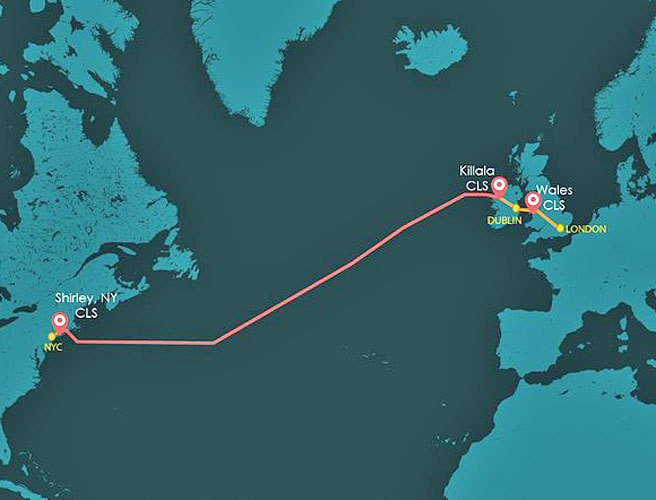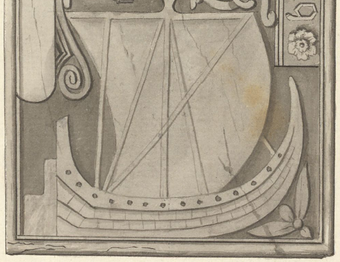Back in the medieval times
From the Norman invasion in 1169, until the late 15th century, Ireland remained peripheral to English state concerns. The Normans had taken the Viking towns as the only recognisable and taxable trading ports along the east and south coast. But, with the faltering of the Norman conquest and the subsequent failure to create a centralised feudal state across the island, English involvement became that of maintaining the failing colony against the resurgent Gaelic zone. But then, in 1492 a Genoese sailor set of into the western sea on his three caravels, and sailed into the sunset and history.
The European discovery of America changed everything. Relations between England and Ireland took on a new urgency. Englands prosperity had been built on the wool trade and other commodities that were traded along the central axis between northern Italy through the Rhine valley and at the trading cities along the Baitic and Netherlands coast. For this trade route England was well placed and Ireland was peripheral. But, the discovery of the new world shifted the emphasis to the west, and access to the Atlantic became a vital requirement to any trading nation wishing to get a bite of the new opportunities.
For England, access to the New World required control of the sea routes around Ireland, especially those along the south coast facing France and controlling the mouth of the English channel. Britains position was not good, as whoever controlled Ireland, controlled Britain simply by blocking their access to the Atlantic. Hence, England fought tooth and nail to acquire Ireland. For the Elizabethans it was a matter of survival. Their desperation won them an Empire.
Control of the Irish ports allowed the expansion into the American colonies, which could begin in earnest only after the Battle of Kinsale. The battles outcome meant that the southern Irish ports were in English hands. A couple of years previous, in 1599 when the war was going very much the Irish way, Aodh Mór Ó’Néill had issued a list of demands to the English Crown. Number 20 said
That all Irishmen may freely traffic with all merchandises, that shall be thought necessary by the Council of State of Ireland for the profit of their Republic, with foreigners or in foreign countries, and that no Irishman shall be troubled for the passage of priests or other religious men.
And number 22
That all Irishmen may freely build ships of what burden they will, furnishing the same with artillery and all munition at their pleasure.
This was at he height of the Nine Years War, and at the low point for the English state, which at this time had lost control of most of the country. The demands tell us what the war was really about. That while it was cloaked in the language of religion, the real tussle was a fight to the death over who was going to prosper from the access to the new trade routes opening on the Atlantic world.
And later, with English policy understanding this strategic reality, the Navigation Acts expressly forbade ships on Atlantic routes to land in Ireland, forcing them to carry on to English ports and then re-exporting to Ireland from there. British goods were imported to Ireland tariff free, but goods going the other way were subject to tariffs. This is how Britain used power to negate Irelands naturally advantageous position in relation to America. Trade was distorted through force.
So there is nothing intrinsically peripheral about Ireland, contrary to what you may have learned in school geography class. The favourable position was a fact, a fact that laws and force sought to cancel and suppress in order to allow Britain to dominate despite its poorer placement for American trade.
But geography doesn’t change, and what was true then, is still true now, it only requires political events to change for the geographic reality to re-assert itself.
Now in the present times
On the 23rd of June 2016, the referendum on membership of the EU was held in Britain. The shockwave of the vote to leave is still reverberating through the region now. And the constitutional crisis in which the UK finds itself makes it seem likely that a hard Brexit is the most likely outcome. Widely regarded as detrimental to Ireland due to its reliance on trade with Britain and use of Britain as a land bridge for trade with the continent. But is it really the disaster it seems?
Intra-continental European trade is already being rerouted as the European union shifts its strategic corridor to the west, linking Ireland to the ports of Belgium and Holland. This is not as efficient as the route through Britain, which Ireland has used up to this point.
However, it is in inter-continental trade that the potential shift is of huge importance. Irelands position west of Britain makes it a more desirable location for transiting American trade into Europe. With Cork perhaps becoming the main distribution centre for intercontinental trade in the future.
Cargo and container transport from North America may be routed to Irish ports instead of Southampton in the event of tariffs or trade deal issues. The emphasis in such a scenario would favour the south and west coast of Ireland for off loading cargo destined for the UK market. The exact opposite of the current setup.
Virtual Traffic
The same logic is also playing out in the realm of internet infrastructure. Irelands position makes it a natural one for the landing of trans-Atlantic cables.
In the far north west of Ireland, the Cable Landing Station, Killala, Co. Mayo is the Irish base for 287 communications cables that form the internet backbone providing high-capacity connectivity from New York to London and beyond to greater Europe. This infastructure supports the placement of data-centres in Ireland as the EMEA headquarters for many American internet companies is based in Ireland.

In terms of this global infrastructure it is the west of Ireland that is in the most favourable position. A new Havefrue cable linking New York, Ireland and Denmark has been announced for 2019, landing at Westport. As demand for this infrastructure continues to grow, and as the only English speaking country within the Euro-zone, it is likely that the west will continue to develop as an important location in global internet infrastructure.
End Game
The Brexiteers imagine a glorious future as a trade hub for Britain, but they may instead have relegated it to relative obscurity, they have mistaken what was artificially constructed for a natural occurence. It could be said that England hhad fought so hard in the first place because, conscious of its paucity of natural resources and location facing the Scandinavian coast on the inhospitable North sea, it knew it had to work harder to fight for an advantage that geography did not naturally provide.
But Brexit strips away the last remnants of the order that Britain so carefully constructed, and forces Ireland to create a new one in which trade routes are centred through itself instead of relying on England. Ireland will now become what it should always have been, the natural and prosperous trading hub and cultural bridge between Europe and North America, had it not been prevented by force for 5 centuries.
Brexit may just be the best thing that could happen to Ireland, and particularly, to Irelands much neglected regions.
Further information

This work is licensed under a Creative Commons Attribution-NonCommercial-NoDerivatives 4.0 International License.

3 responses to “Brexit, Irelands saviour!”
😃🤞🏼! Shhhh… don’t let them know… 😊
Sounds hopeful alright!
LikeLike
Thanks for the comment!
LikeLike
Iontach ar fad a chara! Bheadh aoibhneas rud a tharla le haghaidh Éire! Agus ansin beidh an teanga ceart agus cultúr Gealach níos láidre a fháil in Éirinn freisin. Beidh sé sin an tábhachtach mar atá sé sin cad é Éire go hálainn agus speisialta a dhéanamh ❤
Excellent my friend! That would be a wonderful thing to happen for Ireland! And then the true language and Gaelic culture will get stronger in Ireland too. This will be important because it is what makes Ireland beautiful and unique.
LikeLike